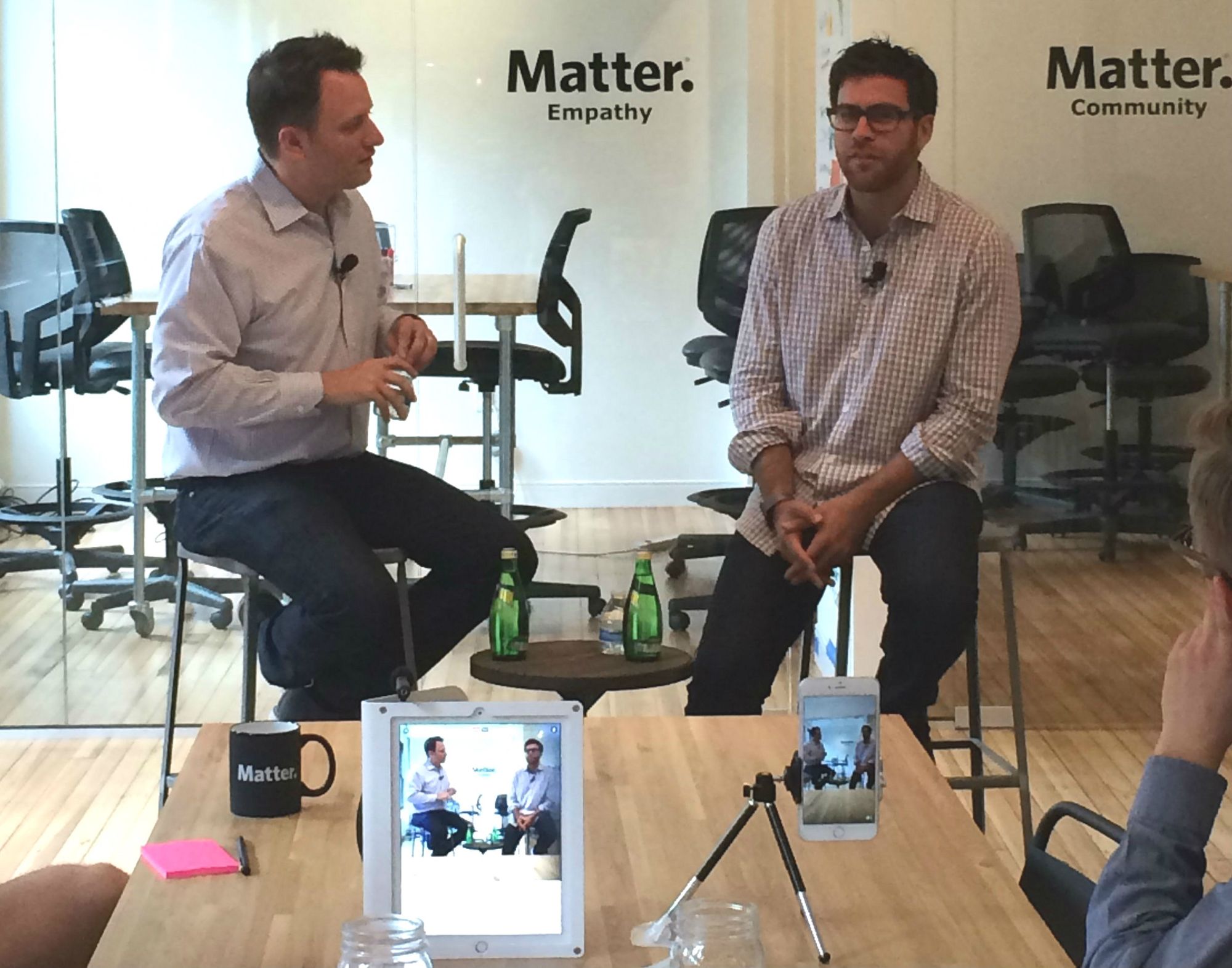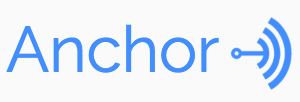“We don’t do a lot with atoms. We’re much more interested in electrons.”

Betaworks is a hybrid beast. Part VC firm, part incubator, part workshop, its core business is the “studio” where new consumer internet companies are built from scratch. Every line of code is written by a Betaworks employee. After a product is released into the world, if it gets positive traction, it may be spun out into a company. Past success stories include Chartbeat, Bitly, SocialFlow, Dots, and Giphy.
Just as we do at Matter, Betaworks sees media as “the connective tissue of society.” Its focus, says Partner Matt Hartman, is on internet-native media companies, the “new interfaces where communication is happening.” He’s been personally interested in communications networks for many years, ever since he built a social media tool for the real estate industry. Now he scouts startups that have the potential to redefine the creation and distribution of information. Betaworks invests an average of $250,000 in 20–25 of them a year.
Matt Hartman recently joined our NYC cohort of entrepreneurs for a fireside chat with Matter Managing Partner, Corey Ford, that delved deeper into his investment hypotheses and what Betaworks looks for in the teams it invests in.

“Let’s actually try to build something that people are going to use”
Matt Hartman is a developer turned founder turned investor. He started writing code at 13 and later studied for a degree combining Cognitive and Computer Science. He was interested, he says, in the early germs of Artificial Intelligence, “how to make computers think more like people and how to make people think more like computers.” He was also conscious of product/market fit from early on, caring about not just how to build something, but how to get people to use it. His first job was building a tech platform for Trammell Crow, a real estate company that CBRE later acquired for two billion dollars. He didn’t know anything about the industry — “in my interview I said ‘I play monopoly’, that was my real estate exposure” — but got the opportunity to pioneer a data-connection platform that is still in use today. “[Trammell Crow] was really thinking pretty far ahead about, ‘how do we become almost like a technology company underneath the hood?’”, he says.
Having been through one acquisition, Hartman soon barreled into another one. He was keen to get some consumer tech experience so he joined HotPotato, an activities-based social network that was acquired by Facebook in 2010 for $10m. Hartman refined his understanding of product development through an iterative, prototype-driven process: “I was constantly thinking about what you guys [at Matter] talk about, which is how do you do consumer-first design, iterate, really test, figure out what the core hypothesis is, and test that?”
Later, after business school, Hartman went deeper into user-centered design: he came up with 3 hypotheses about the real estate industry, and started pitching them to property managers — before he even had a product. The result of their feedback was ReferBoost, a company that married real estate technology and social media. “We ended up building tech behind it and kind of plugging it back in,” says Hartman. “I think about it as a ‘mechanical turk’ — from their perspective it looks like technology, but from our perspective we’re just running a bunch of scripts.”

Eventually Hartman licensed his tool to apartments.com and left Chicago for New York City. He joined Betaworks, which had been, serendipitously, a seed investor in HotPotato. It was a great match. “The kinds of companies I was fundamentally interested in were these communications networks,” says Hartman. “[Betaworks] was talking about things like directional arrows and how the Twitterverse is bi-directional, and that’s the kind of stuff I was super interested in.” In 2014, he began a new chapter as Director of Seed Investments at the venture fund that sits next to the Betaworks studio. That fund had previously invested in Tumblr, Airbnb, TweetDeck, Venmo, and Twitter. Betaworks had also bought Instapaper and recently sold it to Pinterest, and acquired and revamped Digg.com. More recent investments include ProductHunt, and Parlio (in whose seed round Matter also invested), which was acquired by Quora earlier this year.
“Team/market fit is not totally obvious”
The investors at Betaworks have a very specific thesis: they invest in communications platforms and don’t stray too far outside of that model, no matter how compelling the business. “We don’t do a lot with atoms,” says Hartman, meaning hardware, “we’re much more interested in electrons,” — the systems or “pipes” for distributing information. He talks about how the first hire at the Huffington Post would be an editor or content creator, whereas the first at Medium would be a developer, even though it’s a publishing platform. And that’s where Betaworks plays, “at that intersection of the bottom-up content with that first person (the engineer).”
Hartman looks for teams that will win in their category because of specific advantages — they might have the best designer, or be entrenched in the community they serve (a great example being Ryan Hoover at ProductHunt, who had built a network greater than his product). Product/market fit is ubiquitous, but team/market fit, Hartman says, isn’t looked at enough.
Part of his current role, working with early stage startups, is to help founders line up the right investors for their seed round. With a $250,000 check, Betaworks is rarely lead investor, but it can facilitate introductions to other, well-respected, investors — as well as acting as a useful sounding board for startups considering next steps. “Early on,” says Hartman, “there was a company that was deciding between raising another round or getting acquired. And one of the things I thought was interesting was they came to us and not their lead investor. It was helpful to have somebody who looked more like an angel investor to just kind of bounce ideas around.” He says Betaworks is willing to lead “from a conviction perspective” by committing early and sending a positive signal that might help other investors “get over the hump” of making an investment decision.
“We’re in this weird kind of uncanny future”
When asked whether it’s hard to raise money right now, Hartman has a philosophical response as to why the funding landscape is less bountiful than it has been. He says he believes we’re living in world where a lot of products are “derivative” on the one hand, (“we’re really good at social networks, at getting people to click on things”) and on the other, many others are not quite there yet (“cars don’t really drive themselves”). One area of tech that Betaworks looks to for the “next big thing” is interfaces. From chatbots to audio social networks to Amazon Alexa, they’re interested in the new “user interaction models”.

Hartman speaks warmly about the founding team at Anchor, an audio broadcasting app, which Betaworks invested in last August. He’d been looking for a company in the UGC-audio space, and felt the Anchor founders were “head and shoulders above the rest.” When they came in and demoed their product, they didn’t have any users, but they impressed him with the design decisions they were making, their central hypothesis being that for an audio product, a user shouldn’t have to look at it. “These small design decisions were indications they were thinking in a different way,” says Hartman.
One step that Betaworks considers to be very important in the dealflow process is to try the product. With Anchor, they got 20 Betaworks staff members on the app right away, to experience the result of those design decisions, and scope the potential for engagement. When, about a year ago, he was connected to the founder of a custom mobile keyboard called Slash, the first step was to try out an early version of the app through TestFlight. That led to productive conversations with the founders and an eventual seed investment. When Betaworks decides not to invest, Hartman says, he and the other investors try really hard to be very forthcoming about why the company isn’t a good fit, either in terms of thesis, or because the “team just isn’t there yet.” Hartman remembers when the shoe was on the other foot, and he was talking to VCs to potentially fund ReferBoost, “there was this infinite optionality that they want to keep,” but which Betaworks deliberately shies away from.
Two years into his journey as investor, he’s starting to see the fruit of the team’s labors. “The time horizons are so long [in seed investing],” he says, but Betaworks now has a robust portfolio and quite a lot of the companies it has backed are starting to raise their next round. It’s exciting to see them mature. But his focus remains on those initial raises, and as such, his advice for our entrepreneurs is simple: “Build awesome companies that we can invest in early.”
The Drunken Walk is a series of live fireside chats, blog posts, and podcasts (coming soon!) from Matter Ventures, the world’s only independent startup accelerator for media entrepreneurs. We dive into the personal stories of founders, experts, and innovators in media to uncover the moments in their careers that changed everything. Our goal is to inspire and empower the next generation of media entrepreneurs to get from A to B without a map.

